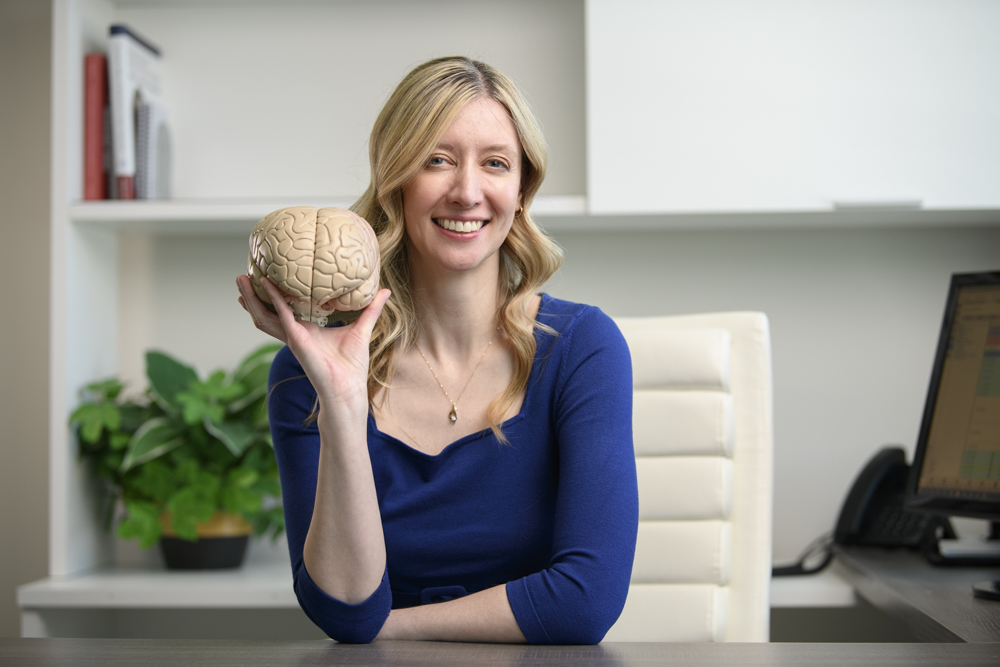An Interview with Dr. Kerrie Schoffer – Lead Clinical Investigator at the C-OPN Halifax Site
- On May 24, 2024

Following a Bachelor of Arts and a Medical Degree at the University of Saskatchewan, Dr. Schoffer completed a neurology residency at Dalhousie University, followed by Movement Disorder training at Columbia University, NYC, and fellowship years at both the Royal Brisbane and Women’s Hospital, Queensland, Australia and Austin Hospital in Melbourne, Australia. Upon returning to Halifax, she established both the Movement Disorders clinic and Huntington’s clinic at the QEII Health Sciences Centre. She is a current executive board member of the Canadian Movement Disorders Group and has authored and coauthored a number of publications, including the Canadian Guidelines on Parkinson’s Disease.
Dr. Schoffer is actively involved as a principal investigator in a number of studies in the areas of Parkinson’s disease and Huntington’s disease, such as Enroll-HD and Generation HD, and she has received the Michael Wright Community Leadership Award from the Huntington’s Society of Canada for her work in the area.
Dr. Schoffer has recently become the Lead Clinical Investigator at the newly launched C-OPN site in Halifax. This is C-OPN first Atlantic Canada site, and we are thrilled to have Dr. Schoffer leading the way.
Here is an interview with Dr. Schoffer:
1. What first peaked your interest to pursue Neurology as a specialty and Movement Disorders as a sub-specialty?
The brain is the ultimate mystery in medicine. There was exciting potential for growth and research in this area, and I have certainly observed that over the course of my career.
Movement disorders interested me because it requires astute bedside clinical skills and visual observation. I also really enjoy interacting with this patient group.
2. How long have you been involved with the Parkinson’s disease (PD) community?
I became interested in Movement disorders during residency, and have been involved in Parkinson’s care as a neurologist since 2007. Over the years, I have been extensively involved in various educational initiatives for trainees, physicians, allied health professionals and patients, as well as research.
3. Did you grow up in the Halifax/Atlantic Canada region? Why was it important for you to practice in this area?
I grew up in Saskatchewan, but came to the Maritimes for my neurology residency. I then had 2 years of fellowship training in Australia. Halifax had no dedicated movement disorder clinic at the time. Building collaborative multidisciplinary programs and providing new services for Parkinson’ patients here was a unique and exciting opportunity.
4. What does it mean to you that Halifax now has a C-OPN site recruiting participants?
C-OPN is another way to bring our community together for a common goal. It is also wonderful to see Halifax welcomed to this initiative along with other larger centres, as smaller regions in Canada often have underrepresented patient populations and perspectives.
5. Why is it important for people living with PD or Atypical Parkinsonisms to participate in research?
Research gives people hope, and it is also the way we see progress in the understanding and treatments of this difficult disease. The experience of Parkinson’s disease can be very isolating, and initiatives such as this reminds participants that they are a part of a larger group working for the common good.
Participating in research is a way people can contribute to create better health for ourselves and for future generations.
6. Would you be able to comment on the PD research landscape in Halifax?
We are a small community, but a vibrant one. We have a number of researchers interested in Parkinson’s, but access to a patient database has been difficult. C-OPN has the potential to be a game-changer.
7. Can you comment a bit about hope, as it relates to the PD community? Have you witnessed improvements in symptom management, care delivery, or access to care for people living with PD in the Halifax region throughout your career thus far?
It is no secret that it is a difficult time for health care in Canada right now, with shortages of resources and physicians across the country, and Halifax is no exception. However, from when I started working in the Maritimes to now, we have seen more physicians than ever involved in Parkinson’s care and novel new therapies emerge. We also have a network of interested physiotherapists, speech language pathologists, rehabilitation specialists and nurses that have taken a special interest in the area. Our city is growing and I expect these networks to continue to build, in addition to creative new solutions for care, for example, using AI technology.
8. Any additional comments?
Thank-you to C-OPN for welcoming us to this initiative!
